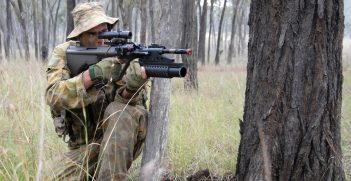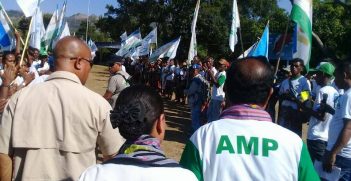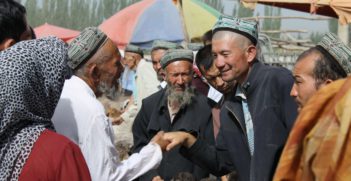Out of Options in Burundi?

As the political situation in Burundi worsens, the international community must explore ways to help the nation construct a flexible and long-term framework for peace.
In early August, Pierre Claver Mbonimpa, grandfather of the Burundian human rights movement, lay in a hospital following a brutal assassination attempt. Not long before, police had violently raided another hospital in Bujumbura, Burundi’s capital, seeking government opponents, leaving a trail of horror behind them. To protect Mbonimpa from a similar fate, several diplomats, including some from the United States and France, as well as African Union officials sat at his bedside for a week as human shields, until Mbonimpa was finally flown to Belgium for medical attention.
Diplomatic options for protecting human rights in Burundi today are similarly in extremis and the country teeters on the verge of renewed civil war. Sweeping popular protests against a third presidential term, a series of failed negotiations and dialogues, international diplomatic outrage, dramatic cuts to aid and trade and a rising number of victims in his own camp only seem to harden President Pierre Nkurunziza’s determination.
A preventative United Nations peacekeeping intervention or regional military involvement, such as the proposed East African Standby Force (EASF), would be problematic. Such intervention would require Nkurunziza’s cooperation, and thus presumably support the stabilization and legitimation of his regime. After having denounced this summer’s elections as illegitimate, coming to Nkurunziza’s rescue to control the spiralling situation would be inconsistent. Yet without the government’s cooperation, foreign troops in Burundi would quickly be labelled an invasion rather than an intervention. An EASF intervention in Burundi could appear as a precarious precedent to regional leaders contemplating extending presidential term limits at home.
The question of sovereignty is delicate. For the past decade, Nkurunziza has expertly maintained a low-intensity violence sufficient to terrorize and coerce the population, without crossing the line into civil war. The president’s party, the CNDD-FDD, has legitimate, widespread popular support and may well have won the popular vote fair and square, even without its array of repressive and coercive tactics. There is no clear figurehead of the current anti-government violence with whom to negotiate, demobilize or peace-keep. Opposition parties are weak, exiled or co-opted by the Nkurunziza government.
It’s time to recognize a few hard facts: Burundi will not be Burkina Faso. Although it consumes the national psyche and the Twitter-sphere, the protest movement has been largely concentrated in a few neighbourhoods of Bujumbura. It has not come close to the level of destruction of the 2014 Burkinabé uprising that burned down the National Assembly and the ruling party headquarters before President Blaise Compaoré fled the country and ultimately resigned. Burundi is a militarized state and has demonstrated its zero-tolerance policy for street protests.
Likewise, international diplomatic muscle-flexing has only added fuel to fire Nkurunziza’s fanaticism. UN and the AU peacekeepers will not rescue this crisis in deus ex machina. Extrajudiciary threats are equally improbable but dangerously inflammatory: the failed coup d’état in May demonstrated the military strength of the president’s loyals, and the August assassination of presidential security advisor General Adolphe Nshimirimana has further heightened security around the president himself and sparked the Imbonerakure (youth wing of the CNDD-FDD) to arms.
It is imperative to stop the current bloodshed and forestall the civil war and/or genocide that could result from a hardening of opposition positions, a loss of control over the Imbonerakure and/or internal division within the armed forces. To do so, the current administration’s excesses must be dramatically curbed. For enduring peace, a negotiated agreement will need to reflect the multifaceted parties in the conflict, from opposition parties to civil society. A government of national unity and a renewed reconciliation process would provide a framework for peace. President Nkurunziza must reiterate his campaign promise that there will be no fourth term under any circumstances.
The international community and peace advocates still have some untested options to pull Burundi from the brink:
AU-led demobilization: The current abuses are centred on a police-led cleansing predicated on a search for illegal firearms amongst the population. Handing this function over to a formal and independent demobilization process could rein in the situation. Such a demobilization structure could ensure that disarmament occurs equally for all parties to the conflict, including the Imbonerakure. Likewise, the broad geographical scope of such a mission would help secure the interior where dozens of political killings have also occurred.
Divide and conquer: In the year preceding the 2015 elections, Nkuruniziza orchestrated a brilliant campaign dividing Burundi’s opposition parties into separate wings. He effectively decapitated the parties by buying off internal factions and forcing out the parties’ established leaders. Today, as Nkurunziza himself appears implacable to compromise and any form of outside intervention, domestic or foreign, could further destabilize the situation, one of the best chances Burundi has for peace would be for the CNDD-FDD to manage their own house. If a critical mass within the CNDD-FDD party were effectively convinced that their long-term interests were best served without Nkurunziza, change might yet come from within.
Faith-based diplomacy: Nzurunziza is a dedicated Born Again Christian who believes that he is president by Divine Will. Despite being at odds with Burundi’s powerful Catholic Church, which has condemned the third term in no uncertain language, Nkurunziza defines himself by his faith. The international religious community could be a powerful force to prevail on him to follow the teachings of the Prince of Peace.
Hit ‘em where it hurts. Implementation of proposed sanctions, including travel bans and asset freezes, should be immediate. Limiting and ultimately suspending Burundian participation in the East African Community and African Union, including in lucrative regional peacekeeping missions, should also be on the table.
Give peace a chance: The diplomats’ night time hospital vigils with Pierre Claver Mbonimpa are a powerful example of raw personal engagement for peace. Burundi would benefit from more of this on a much larger scale. Hundreds of local community leaders have acted for peace in the past months, calling for and leading local-level dialogue and engaging their communities for peace. The basis for a large-scale peace movement in Burundi exists. Today there is a need to bring these voices together in a non-violent movement. Peace activists should draw inspiration from the Women of Liberal Mass Action for Peace campaign that helped end the war in Liberia. Instead of Burundi’s confrontational, inflammatory street demonstrations of these past months, the Liberian protest movement virtually shut down the conflict by sitting down – through massive non-violent sit-ins that, at one point, went so far as to effectively hold the international mediation team hostage until they arrived at a solution. It’s time for bold and creative peace action.
The situation in Burundi today is extraordinarily fragile. Staunching the violence is urgent. Building peace requires long-term vision, especially at the height of the emergency. Any solution must avoid alienating the CNDD-FDD party or the Imbonerakure, or risk unleashing a brutal war of revenge. The CNDD-FDD, the most significant political organization in the country, has no apparent successor for leadership. Political party strengthening activities for both CNDD-FDD and opposition groups, restoring and rebuilding independent media, youth engagement and community reconciliation efforts and ongoing human rights monitoring will all be helpful in constructing a long-term solution. It is time to take decisive action to bring Burundi back from the brink.
Gabrielle Bardall is a doctoral candidate at the University of Montreal and has advised on democracy and political violence issues in Burundi for over a decade for various international organisations, including UN agencies and international non-profits. This article was originally published on Open Canada on 1 December. It is republished with permission.





